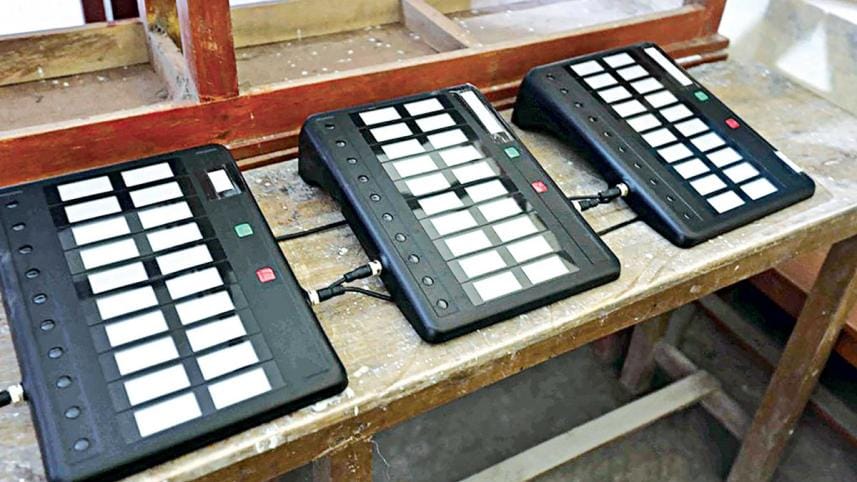Give pointers on polls-time govt

Transparency International Bangladesh yesterday said the Election Commission can give suggestions to the government or the authorities concerned on how the polls-time government should conduct itself.
The Bangladesh chapter of the Berlin-based anti-corruption watchdog, which also carries out research on various election issues, also proposed that the EC should decide to use electronic voting machine (EVM) only after ensuring that it is accepted by all stakeholders and is technically faultless.
"Election Commission said that they are still thinking about it [use of EVM] and they are yet to take any decision regarding the matter," TIB Executive Director Iftekharuzzaman told reporters after holding a meeting with Chief Election Commissioner Kazi Habibul Awal at the EC office in the capital.
"People of the country have expectations and concerns about the character, behaviour, shape and composition of the election-time government … The EC can give its suggestions to the government or the authorities concerned on how the polls-time government should behave during elections. The Election Commission can also propose to reform laws if needed," he said.
A polls-time government usually works to perform routine functions after the election schedule is announced. In November 17, 2013, the then government formed a polls-time cabinet ahead of January 5, 2014 elections.
No such government was formed ahead of the last national election held on December 30, 2018.
Iftekharuzzaman said usually polls time government's size is smaller. They should not take any new policy decision or take up any new projects.
If the EC feels there is a need to reform the constitution or law in the interest of making elections free and fair, then it can propose to do so, he said.
"Whether the concerned authority will consider it or not is a matter for that authority."
TIB also urged for maintaining a level playing field for candidates. "Now MPs and cabinet members can take part in elections while in their positions of power and many think that destroys the level playing field, and this claim is realistic," Ifthekhar said.
TIB in a statement yesterday said if the ruling-party ministers and MPs are allowed to go to polls without resigning, the EC can propose to reform the law to ensure that there is a level field.
The graft watchdog urged the EC to take active initiatives to ensure participation of all political parties in elections and earn confidence of all concerned, especially voters.
They also recommended that the release of information during elections should not be hindered in any way. Local and foreign observers, as well as media, should be able to operate in a free and unhindered manner and the internet and mobile networks should not be shut down.
CEC Habibul said they told the TIB delegation that the government is obliged to cooperate with the EC as per law.
In many countries elections take place under a political government. A government and a party are two different things; there is prime minister and cabinet members in a government and they took an oath that they would behave equitably.
"We believe they know their oaths. At least during the election, in the interest of a fair election, they will behave like an election-time government," Habibul said.



 For all latest news, follow The Daily Star's Google News channel.
For all latest news, follow The Daily Star's Google News channel.
Comments